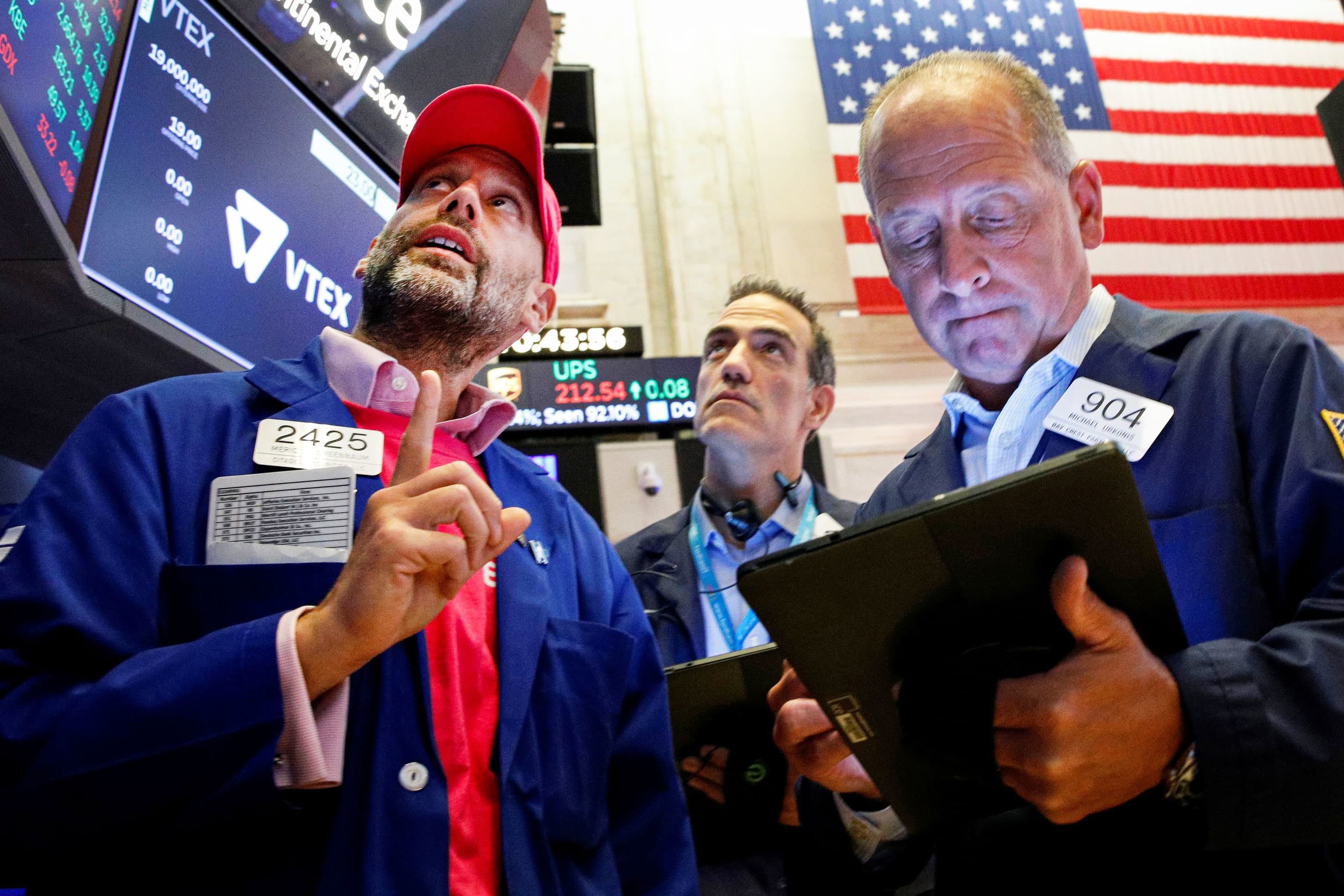Dow falls into the red in final hour of trading, down more than 50 points after losing early gain

U.S. stocks gave up early gains and turned negative for the session on Monday as concerns about Covid variants and peaking economic growth weighed against strong earnings results.
The Dow Jones Industrial Average ticked down about just 7 points and S&P 500 rose 0.1%, well off their highs of the session. The Nasdaq Composite added 0.3%. The S&P 500 and the Dow threatened to hit new all-time highs earlier in the session.
Senators introduced a bipartisan infrastructure bill over the weekend, bolstering optimism on Monday. The bill includes $550 billion in new spending over five years. That’s on top of previously approved funds of around $450 billion.
Senate Majority Leader Chuck Schumer is pushing for the bill to be passed before the chamber goes on recess on Aug. 9. Votes on amendments and a separate budget measure could prove to be hurdles that slow down the timeline for the bill.
Still, Monday’s tepid performance for stocks came as Treasury yields and oil prices dipped, signaling that some investors may be concerned about economic growth even as earnings results show strength.
“The markets are having a hard time making up their mind as investors look for the next catalyst in either direction,” Canaccord Genuity analyst Tony Dwyer said in a note to clients. “The fear over the Delta variant of the Covid-19 virus and the other side of ‘peak everything’ has investors on edge, while the monetary and fiscal support for the economy coupled with historically strong earnings keeps liquidity high.”
The 10-year Treasury yield fell to roughly 1.17%, putting it near its recent lows from mid-July. Yields move inverse to prices. The final July reading for the IHS Markit manufacturing purchasing manager’s index came in at 63.4 on Monday, up from the 63.1 preliminary reading and June’s result of 62.1. However, a similar metric from the Instituted for Supply Management dipped slightly in July.
Kathy Jones, chief fixed income strategist at Charles Schwab, said that concerns about slowing growth and the delta variant could be reasons for yields to move lower but still couldn’t explain the current level for bonds.
“I think the whole world expects yields to move up, and maybe that’s why they can’t,” Jones said.
One of the top performers on Wall Street was Square, whose shares rose 12% on Monday after Jack Dorsey’s payment company reported announced a $29 billion all-stock deal to buy Australian installment loan provider Afterpay. Square also reported its second quarter earnings, saying its gross profit rose 91% year over year and that its Cash App has 40 million monthly active customers.
Automaker Tesla was another major winner on Monday, with the volatile stock rising 4%.
The S&P 500 managed to notch its sixth month of gains in July, although volatility increased amid concerns about the economic recovery in the face of the spreading delta Covid variant. It’s the best monthly winning streak for the benchmark since 2018. The Nasdaq Composite and Dow Jones Industrial Average added about 1.2% and 1.3%, respectively, in July, while the broad S&P 500 gained close to 2.3% last month.
The U.S. is averaging more than 63,000 new Covid cases a day the last 7 days, according to the latest CDC data, near its highest level since April this year.
Local governments and companies have started to impose new rules, including Target requiring masks for workers in high-risk areas and Equinox requiring proof of vaccination for gym members and staff. Officials in the San Francisco area are bringing back mask mandates this week, while New York officials on Monday encouraged people to wear masks indoors, even if they are fully vaccinated.
However, stocks are still trading near all-time highs even as concerns grow about the delta variant.
“At the end of the day, the stock market is driven by two things: 1) Earnings and 2) Multiples and until COVID (or China) begins to negatively impact one or both of those metrics, stocks can stay resilient,’ Tom Essaye, founder of Sevens Report, said in a note.
On Monday, travel stocks, including airlines and cruise lines, that could be hit hard by a continued Covid wave were mixed.
An overall strong earnings season continues to be a tailwind for the market. So far, 88% of S&P 500 companies that have reported have topped EPS estimates, according to FactSet. For the second quarter, the S&P 500 is on track to post earnings growth of 85.1%, which would be the best growth rate since 2009, according to FactSet.
The first trading day of August comes with more big earnings on the way. Lyft, Amgen, Uber, CVS Health, General Motors and Roku all report quarterly results this week.
One major negative during earnings season has been Amazon, which sank nearly 7.6% Friday after the tech giant reported its first quarterly revenue miss in three years and gave weaker guidance. The stock was little changed on Monday.




